The Interplay of Internet and Democracy: Research and Findings Report
VerifiedAdded on 2019/09/22
|7
|2948
|228
Report
AI Summary
This report delves into the intricate relationship between the internet and democracy, examining both its positive and negative impacts. It highlights how the internet enhances information transparency, promotes freedom of speech, and facilitates government accountability, while also acknowledging potential downsides such as the spread of misinformation and the potential for government surveillance. The report reviews existing literature, including a study on physical education teachers' attitudes towards internet and democracy, and a cross-country analysis of the correlation between internet usage and democratic processes. The findings underscore the internet's transformative influence on democratic participation, political discourse, and the global dissemination of democratic ideals, while also cautioning against its potential misuse.
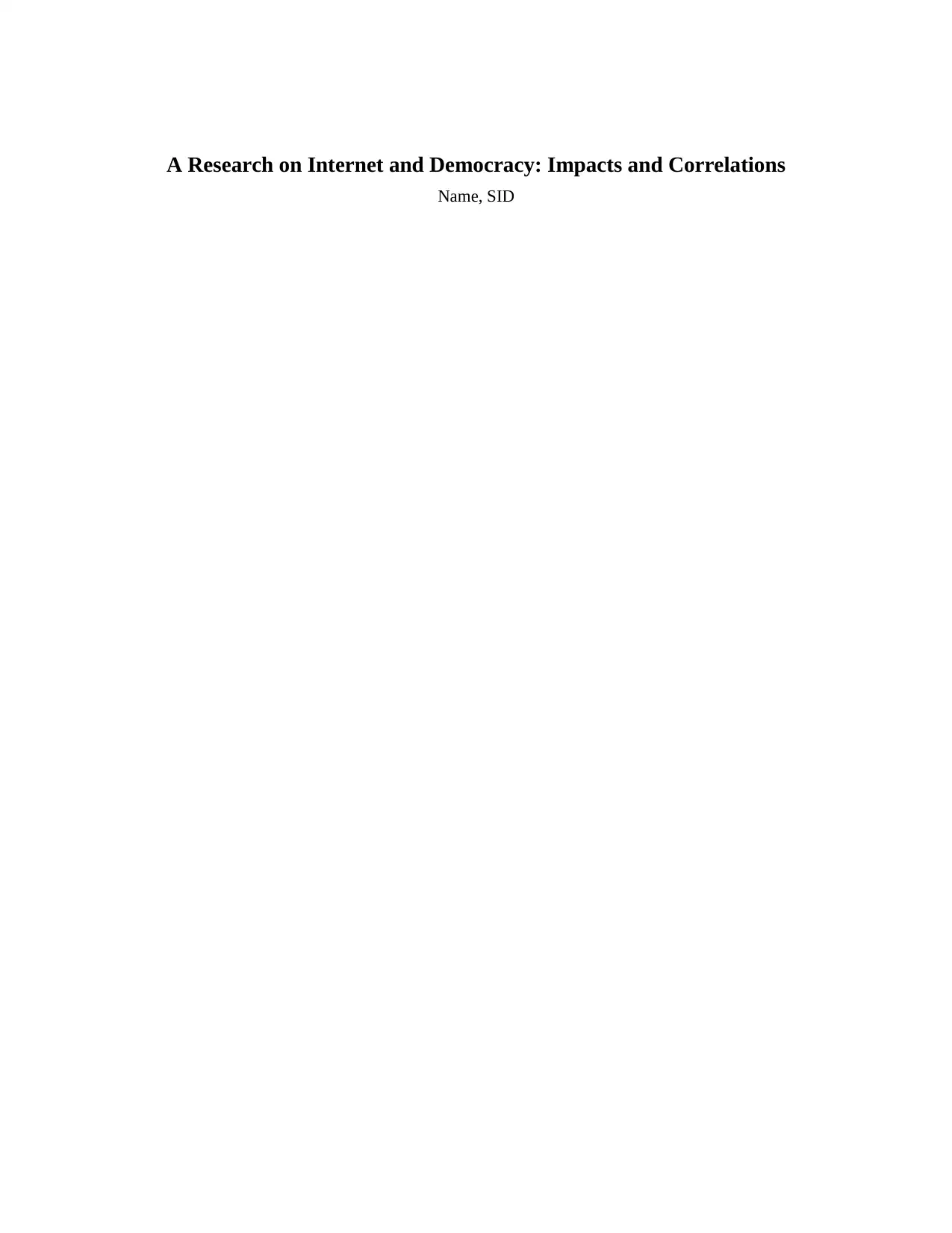
A Research on Internet and Democracy: Impacts and Correlations
Name, SID
Name, SID
Paraphrase This Document
Need a fresh take? Get an instant paraphrase of this document with our AI Paraphraser
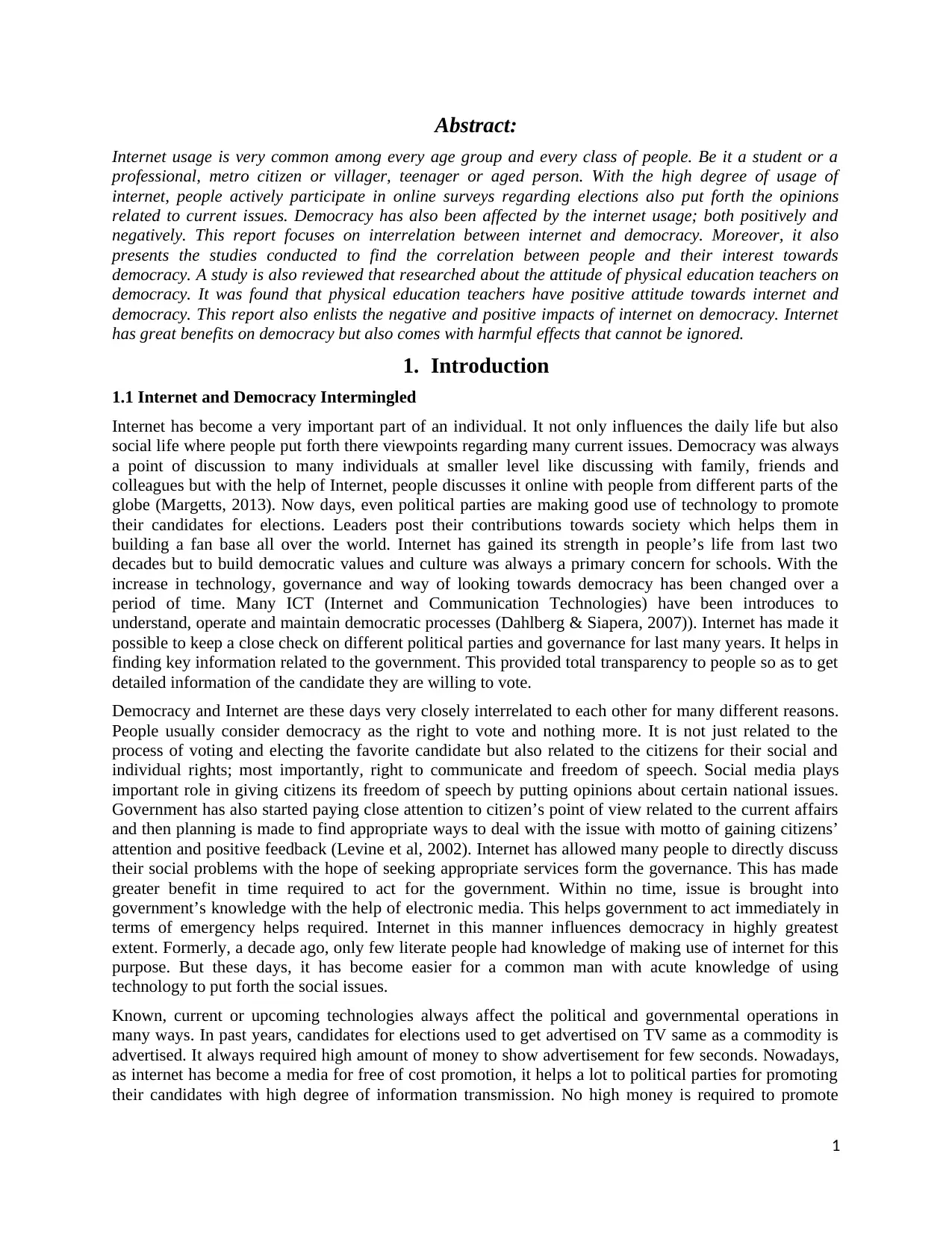
Abstract:
Internet usage is very common among every age group and every class of people. Be it a student or a
professional, metro citizen or villager, teenager or aged person. With the high degree of usage of
internet, people actively participate in online surveys regarding elections also put forth the opinions
related to current issues. Democracy has also been affected by the internet usage; both positively and
negatively. This report focuses on interrelation between internet and democracy. Moreover, it also
presents the studies conducted to find the correlation between people and their interest towards
democracy. A study is also reviewed that researched about the attitude of physical education teachers on
democracy. It was found that physical education teachers have positive attitude towards internet and
democracy. This report also enlists the negative and positive impacts of internet on democracy. Internet
has great benefits on democracy but also comes with harmful effects that cannot be ignored.
1. Introduction
1.1 Internet and Democracy Intermingled
Internet has become a very important part of an individual. It not only influences the daily life but also
social life where people put forth there viewpoints regarding many current issues. Democracy was always
a point of discussion to many individuals at smaller level like discussing with family, friends and
colleagues but with the help of Internet, people discusses it online with people from different parts of the
globe (Margetts, 2013). Now days, even political parties are making good use of technology to promote
their candidates for elections. Leaders post their contributions towards society which helps them in
building a fan base all over the world. Internet has gained its strength in people’s life from last two
decades but to build democratic values and culture was always a primary concern for schools. With the
increase in technology, governance and way of looking towards democracy has been changed over a
period of time. Many ICT (Internet and Communication Technologies) have been introduces to
understand, operate and maintain democratic processes (Dahlberg & Siapera, 2007)). Internet has made it
possible to keep a close check on different political parties and governance for last many years. It helps in
finding key information related to the government. This provided total transparency to people so as to get
detailed information of the candidate they are willing to vote.
Democracy and Internet are these days very closely interrelated to each other for many different reasons.
People usually consider democracy as the right to vote and nothing more. It is not just related to the
process of voting and electing the favorite candidate but also related to the citizens for their social and
individual rights; most importantly, right to communicate and freedom of speech. Social media plays
important role in giving citizens its freedom of speech by putting opinions about certain national issues.
Government has also started paying close attention to citizen’s point of view related to the current affairs
and then planning is made to find appropriate ways to deal with the issue with motto of gaining citizens’
attention and positive feedback (Levine et al, 2002). Internet has allowed many people to directly discuss
their social problems with the hope of seeking appropriate services form the governance. This has made
greater benefit in time required to act for the government. Within no time, issue is brought into
government’s knowledge with the help of electronic media. This helps government to act immediately in
terms of emergency helps required. Internet in this manner influences democracy in highly greatest
extent. Formerly, a decade ago, only few literate people had knowledge of making use of internet for this
purpose. But these days, it has become easier for a common man with acute knowledge of using
technology to put forth the social issues.
Known, current or upcoming technologies always affect the political and governmental operations in
many ways. In past years, candidates for elections used to get advertised on TV same as a commodity is
advertised. It always required high amount of money to show advertisement for few seconds. Nowadays,
as internet has become a media for free of cost promotion, it helps a lot to political parties for promoting
their candidates with high degree of information transmission. No high money is required to promote
1
Internet usage is very common among every age group and every class of people. Be it a student or a
professional, metro citizen or villager, teenager or aged person. With the high degree of usage of
internet, people actively participate in online surveys regarding elections also put forth the opinions
related to current issues. Democracy has also been affected by the internet usage; both positively and
negatively. This report focuses on interrelation between internet and democracy. Moreover, it also
presents the studies conducted to find the correlation between people and their interest towards
democracy. A study is also reviewed that researched about the attitude of physical education teachers on
democracy. It was found that physical education teachers have positive attitude towards internet and
democracy. This report also enlists the negative and positive impacts of internet on democracy. Internet
has great benefits on democracy but also comes with harmful effects that cannot be ignored.
1. Introduction
1.1 Internet and Democracy Intermingled
Internet has become a very important part of an individual. It not only influences the daily life but also
social life where people put forth there viewpoints regarding many current issues. Democracy was always
a point of discussion to many individuals at smaller level like discussing with family, friends and
colleagues but with the help of Internet, people discusses it online with people from different parts of the
globe (Margetts, 2013). Now days, even political parties are making good use of technology to promote
their candidates for elections. Leaders post their contributions towards society which helps them in
building a fan base all over the world. Internet has gained its strength in people’s life from last two
decades but to build democratic values and culture was always a primary concern for schools. With the
increase in technology, governance and way of looking towards democracy has been changed over a
period of time. Many ICT (Internet and Communication Technologies) have been introduces to
understand, operate and maintain democratic processes (Dahlberg & Siapera, 2007)). Internet has made it
possible to keep a close check on different political parties and governance for last many years. It helps in
finding key information related to the government. This provided total transparency to people so as to get
detailed information of the candidate they are willing to vote.
Democracy and Internet are these days very closely interrelated to each other for many different reasons.
People usually consider democracy as the right to vote and nothing more. It is not just related to the
process of voting and electing the favorite candidate but also related to the citizens for their social and
individual rights; most importantly, right to communicate and freedom of speech. Social media plays
important role in giving citizens its freedom of speech by putting opinions about certain national issues.
Government has also started paying close attention to citizen’s point of view related to the current affairs
and then planning is made to find appropriate ways to deal with the issue with motto of gaining citizens’
attention and positive feedback (Levine et al, 2002). Internet has allowed many people to directly discuss
their social problems with the hope of seeking appropriate services form the governance. This has made
greater benefit in time required to act for the government. Within no time, issue is brought into
government’s knowledge with the help of electronic media. This helps government to act immediately in
terms of emergency helps required. Internet in this manner influences democracy in highly greatest
extent. Formerly, a decade ago, only few literate people had knowledge of making use of internet for this
purpose. But these days, it has become easier for a common man with acute knowledge of using
technology to put forth the social issues.
Known, current or upcoming technologies always affect the political and governmental operations in
many ways. In past years, candidates for elections used to get advertised on TV same as a commodity is
advertised. It always required high amount of money to show advertisement for few seconds. Nowadays,
as internet has become a media for free of cost promotion, it helps a lot to political parties for promoting
their candidates with high degree of information transmission. No high money is required to promote
1
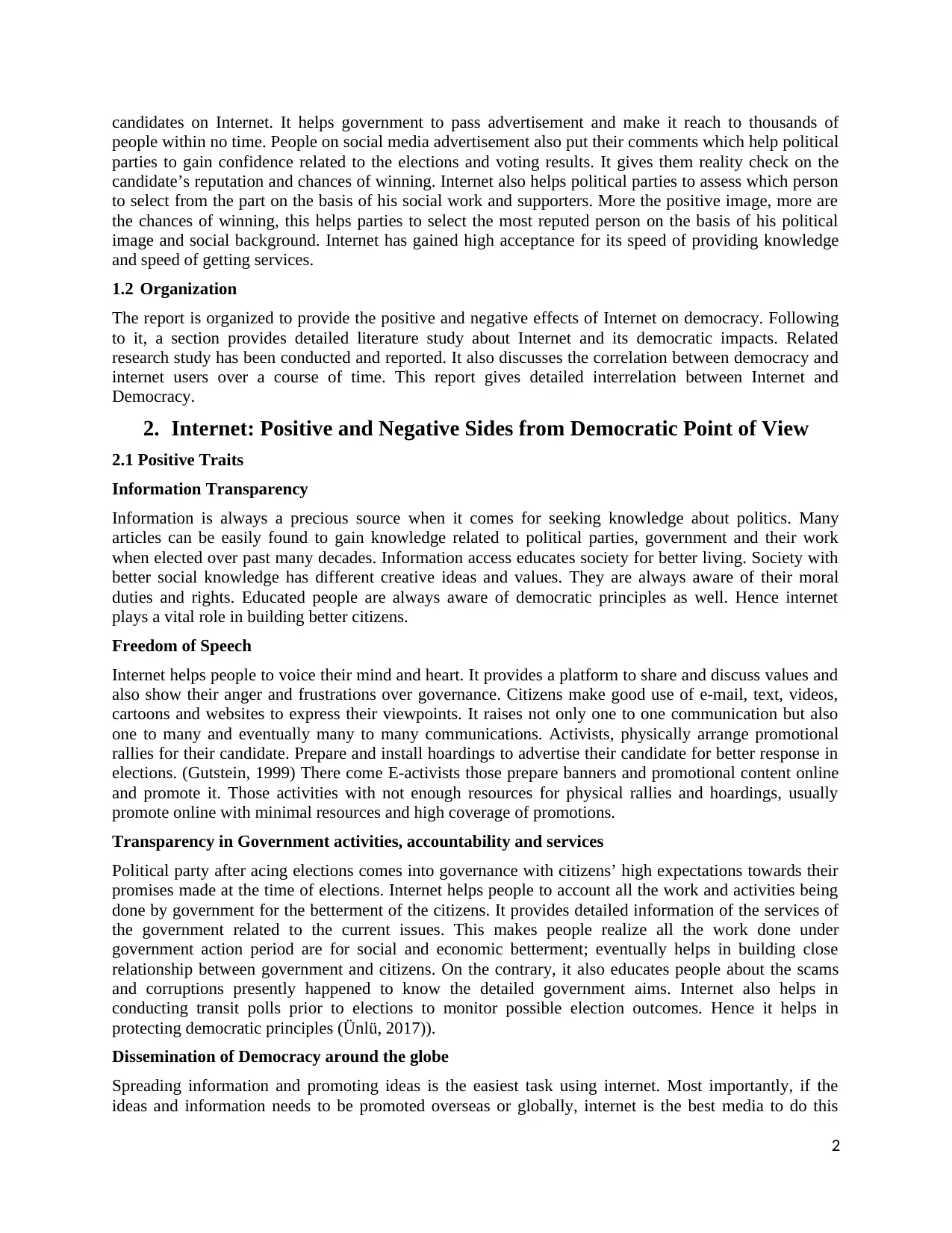
candidates on Internet. It helps government to pass advertisement and make it reach to thousands of
people within no time. People on social media advertisement also put their comments which help political
parties to gain confidence related to the elections and voting results. It gives them reality check on the
candidate’s reputation and chances of winning. Internet also helps political parties to assess which person
to select from the part on the basis of his social work and supporters. More the positive image, more are
the chances of winning, this helps parties to select the most reputed person on the basis of his political
image and social background. Internet has gained high acceptance for its speed of providing knowledge
and speed of getting services.
1.2 Organization
The report is organized to provide the positive and negative effects of Internet on democracy. Following
to it, a section provides detailed literature study about Internet and its democratic impacts. Related
research study has been conducted and reported. It also discusses the correlation between democracy and
internet users over a course of time. This report gives detailed interrelation between Internet and
Democracy.
2. Internet: Positive and Negative Sides from Democratic Point of View
2.1 Positive Traits
Information Transparency
Information is always a precious source when it comes for seeking knowledge about politics. Many
articles can be easily found to gain knowledge related to political parties, government and their work
when elected over past many decades. Information access educates society for better living. Society with
better social knowledge has different creative ideas and values. They are always aware of their moral
duties and rights. Educated people are always aware of democratic principles as well. Hence internet
plays a vital role in building better citizens.
Freedom of Speech
Internet helps people to voice their mind and heart. It provides a platform to share and discuss values and
also show their anger and frustrations over governance. Citizens make good use of e-mail, text, videos,
cartoons and websites to express their viewpoints. It raises not only one to one communication but also
one to many and eventually many to many communications. Activists, physically arrange promotional
rallies for their candidate. Prepare and install hoardings to advertise their candidate for better response in
elections. (Gutstein, 1999) There come E-activists those prepare banners and promotional content online
and promote it. Those activities with not enough resources for physical rallies and hoardings, usually
promote online with minimal resources and high coverage of promotions.
Transparency in Government activities, accountability and services
Political party after acing elections comes into governance with citizens’ high expectations towards their
promises made at the time of elections. Internet helps people to account all the work and activities being
done by government for the betterment of the citizens. It provides detailed information of the services of
the government related to the current issues. This makes people realize all the work done under
government action period are for social and economic betterment; eventually helps in building close
relationship between government and citizens. On the contrary, it also educates people about the scams
and corruptions presently happened to know the detailed government aims. Internet also helps in
conducting transit polls prior to elections to monitor possible election outcomes. Hence it helps in
protecting democratic principles (Ünlü, 2017)).
Dissemination of Democracy around the globe
Spreading information and promoting ideas is the easiest task using internet. Most importantly, if the
ideas and information needs to be promoted overseas or globally, internet is the best media to do this
2
people within no time. People on social media advertisement also put their comments which help political
parties to gain confidence related to the elections and voting results. It gives them reality check on the
candidate’s reputation and chances of winning. Internet also helps political parties to assess which person
to select from the part on the basis of his social work and supporters. More the positive image, more are
the chances of winning, this helps parties to select the most reputed person on the basis of his political
image and social background. Internet has gained high acceptance for its speed of providing knowledge
and speed of getting services.
1.2 Organization
The report is organized to provide the positive and negative effects of Internet on democracy. Following
to it, a section provides detailed literature study about Internet and its democratic impacts. Related
research study has been conducted and reported. It also discusses the correlation between democracy and
internet users over a course of time. This report gives detailed interrelation between Internet and
Democracy.
2. Internet: Positive and Negative Sides from Democratic Point of View
2.1 Positive Traits
Information Transparency
Information is always a precious source when it comes for seeking knowledge about politics. Many
articles can be easily found to gain knowledge related to political parties, government and their work
when elected over past many decades. Information access educates society for better living. Society with
better social knowledge has different creative ideas and values. They are always aware of their moral
duties and rights. Educated people are always aware of democratic principles as well. Hence internet
plays a vital role in building better citizens.
Freedom of Speech
Internet helps people to voice their mind and heart. It provides a platform to share and discuss values and
also show their anger and frustrations over governance. Citizens make good use of e-mail, text, videos,
cartoons and websites to express their viewpoints. It raises not only one to one communication but also
one to many and eventually many to many communications. Activists, physically arrange promotional
rallies for their candidate. Prepare and install hoardings to advertise their candidate for better response in
elections. (Gutstein, 1999) There come E-activists those prepare banners and promotional content online
and promote it. Those activities with not enough resources for physical rallies and hoardings, usually
promote online with minimal resources and high coverage of promotions.
Transparency in Government activities, accountability and services
Political party after acing elections comes into governance with citizens’ high expectations towards their
promises made at the time of elections. Internet helps people to account all the work and activities being
done by government for the betterment of the citizens. It provides detailed information of the services of
the government related to the current issues. This makes people realize all the work done under
government action period are for social and economic betterment; eventually helps in building close
relationship between government and citizens. On the contrary, it also educates people about the scams
and corruptions presently happened to know the detailed government aims. Internet also helps in
conducting transit polls prior to elections to monitor possible election outcomes. Hence it helps in
protecting democratic principles (Ünlü, 2017)).
Dissemination of Democracy around the globe
Spreading information and promoting ideas is the easiest task using internet. Most importantly, if the
ideas and information needs to be promoted overseas or globally, internet is the best media to do this
2
⊘ This is a preview!⊘
Do you want full access?
Subscribe today to unlock all pages.

Trusted by 1+ million students worldwide
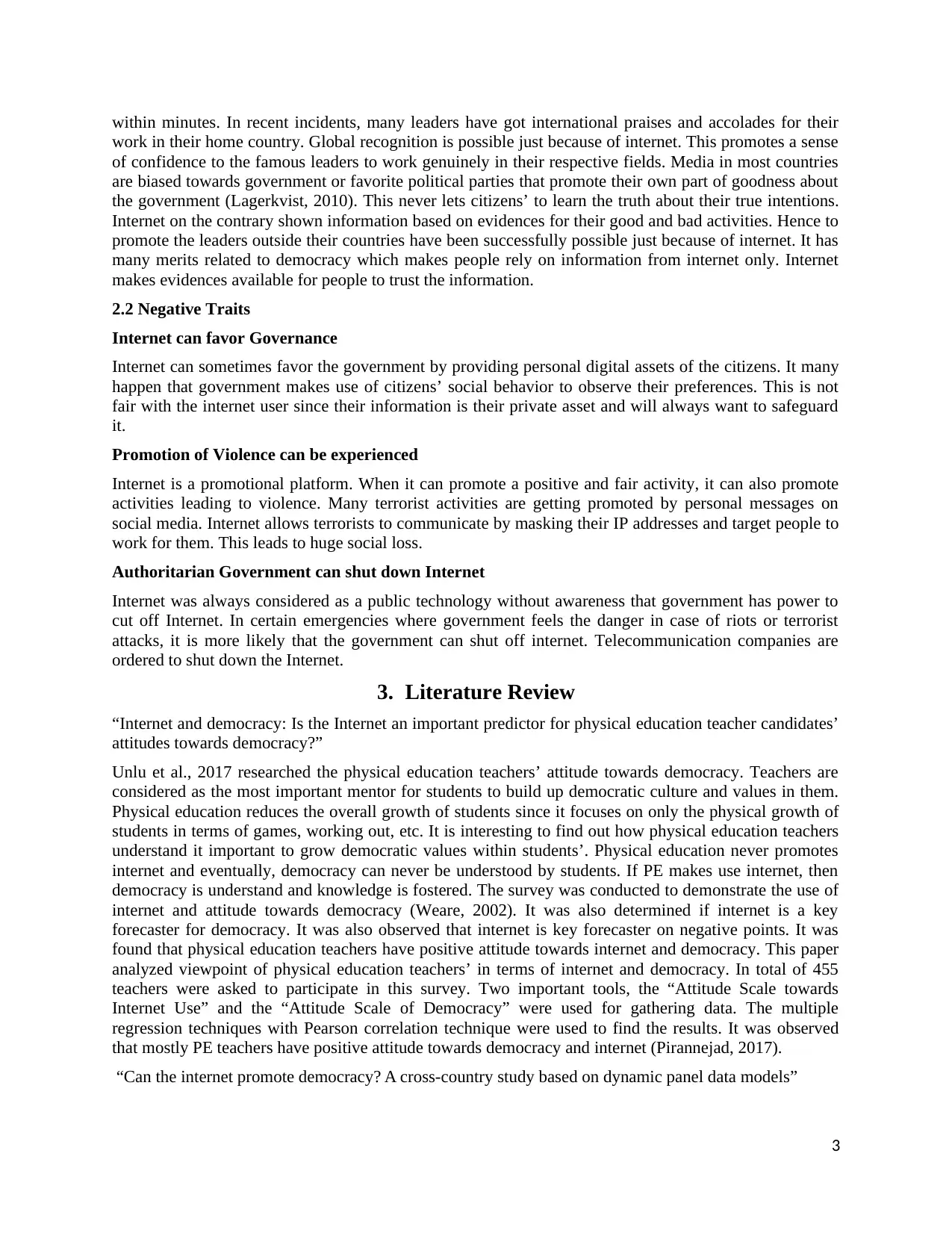
within minutes. In recent incidents, many leaders have got international praises and accolades for their
work in their home country. Global recognition is possible just because of internet. This promotes a sense
of confidence to the famous leaders to work genuinely in their respective fields. Media in most countries
are biased towards government or favorite political parties that promote their own part of goodness about
the government (Lagerkvist, 2010). This never lets citizens’ to learn the truth about their true intentions.
Internet on the contrary shown information based on evidences for their good and bad activities. Hence to
promote the leaders outside their countries have been successfully possible just because of internet. It has
many merits related to democracy which makes people rely on information from internet only. Internet
makes evidences available for people to trust the information.
2.2 Negative Traits
Internet can favor Governance
Internet can sometimes favor the government by providing personal digital assets of the citizens. It many
happen that government makes use of citizens’ social behavior to observe their preferences. This is not
fair with the internet user since their information is their private asset and will always want to safeguard
it.
Promotion of Violence can be experienced
Internet is a promotional platform. When it can promote a positive and fair activity, it can also promote
activities leading to violence. Many terrorist activities are getting promoted by personal messages on
social media. Internet allows terrorists to communicate by masking their IP addresses and target people to
work for them. This leads to huge social loss.
Authoritarian Government can shut down Internet
Internet was always considered as a public technology without awareness that government has power to
cut off Internet. In certain emergencies where government feels the danger in case of riots or terrorist
attacks, it is more likely that the government can shut off internet. Telecommunication companies are
ordered to shut down the Internet.
3. Literature Review
“Internet and democracy: Is the Internet an important predictor for physical education teacher candidates’
attitudes towards democracy?”
Unlu et al., 2017 researched the physical education teachers’ attitude towards democracy. Teachers are
considered as the most important mentor for students to build up democratic culture and values in them.
Physical education reduces the overall growth of students since it focuses on only the physical growth of
students in terms of games, working out, etc. It is interesting to find out how physical education teachers
understand it important to grow democratic values within students’. Physical education never promotes
internet and eventually, democracy can never be understood by students. If PE makes use internet, then
democracy is understand and knowledge is fostered. The survey was conducted to demonstrate the use of
internet and attitude towards democracy (Weare, 2002). It was also determined if internet is a key
forecaster for democracy. It was also observed that internet is key forecaster on negative points. It was
found that physical education teachers have positive attitude towards internet and democracy. This paper
analyzed viewpoint of physical education teachers’ in terms of internet and democracy. In total of 455
teachers were asked to participate in this survey. Two important tools, the “Attitude Scale towards
Internet Use” and the “Attitude Scale of Democracy” were used for gathering data. The multiple
regression techniques with Pearson correlation technique were used to find the results. It was observed
that mostly PE teachers have positive attitude towards democracy and internet (Pirannejad, 2017).
“Can the internet promote democracy? A cross-country study based on dynamic panel data models”
3
work in their home country. Global recognition is possible just because of internet. This promotes a sense
of confidence to the famous leaders to work genuinely in their respective fields. Media in most countries
are biased towards government or favorite political parties that promote their own part of goodness about
the government (Lagerkvist, 2010). This never lets citizens’ to learn the truth about their true intentions.
Internet on the contrary shown information based on evidences for their good and bad activities. Hence to
promote the leaders outside their countries have been successfully possible just because of internet. It has
many merits related to democracy which makes people rely on information from internet only. Internet
makes evidences available for people to trust the information.
2.2 Negative Traits
Internet can favor Governance
Internet can sometimes favor the government by providing personal digital assets of the citizens. It many
happen that government makes use of citizens’ social behavior to observe their preferences. This is not
fair with the internet user since their information is their private asset and will always want to safeguard
it.
Promotion of Violence can be experienced
Internet is a promotional platform. When it can promote a positive and fair activity, it can also promote
activities leading to violence. Many terrorist activities are getting promoted by personal messages on
social media. Internet allows terrorists to communicate by masking their IP addresses and target people to
work for them. This leads to huge social loss.
Authoritarian Government can shut down Internet
Internet was always considered as a public technology without awareness that government has power to
cut off Internet. In certain emergencies where government feels the danger in case of riots or terrorist
attacks, it is more likely that the government can shut off internet. Telecommunication companies are
ordered to shut down the Internet.
3. Literature Review
“Internet and democracy: Is the Internet an important predictor for physical education teacher candidates’
attitudes towards democracy?”
Unlu et al., 2017 researched the physical education teachers’ attitude towards democracy. Teachers are
considered as the most important mentor for students to build up democratic culture and values in them.
Physical education reduces the overall growth of students since it focuses on only the physical growth of
students in terms of games, working out, etc. It is interesting to find out how physical education teachers
understand it important to grow democratic values within students’. Physical education never promotes
internet and eventually, democracy can never be understood by students. If PE makes use internet, then
democracy is understand and knowledge is fostered. The survey was conducted to demonstrate the use of
internet and attitude towards democracy (Weare, 2002). It was also determined if internet is a key
forecaster for democracy. It was also observed that internet is key forecaster on negative points. It was
found that physical education teachers have positive attitude towards internet and democracy. This paper
analyzed viewpoint of physical education teachers’ in terms of internet and democracy. In total of 455
teachers were asked to participate in this survey. Two important tools, the “Attitude Scale towards
Internet Use” and the “Attitude Scale of Democracy” were used for gathering data. The multiple
regression techniques with Pearson correlation technique were used to find the results. It was observed
that mostly PE teachers have positive attitude towards democracy and internet (Pirannejad, 2017).
“Can the internet promote democracy? A cross-country study based on dynamic panel data models”
3
Paraphrase This Document
Need a fresh take? Get an instant paraphrase of this document with our AI Paraphraser
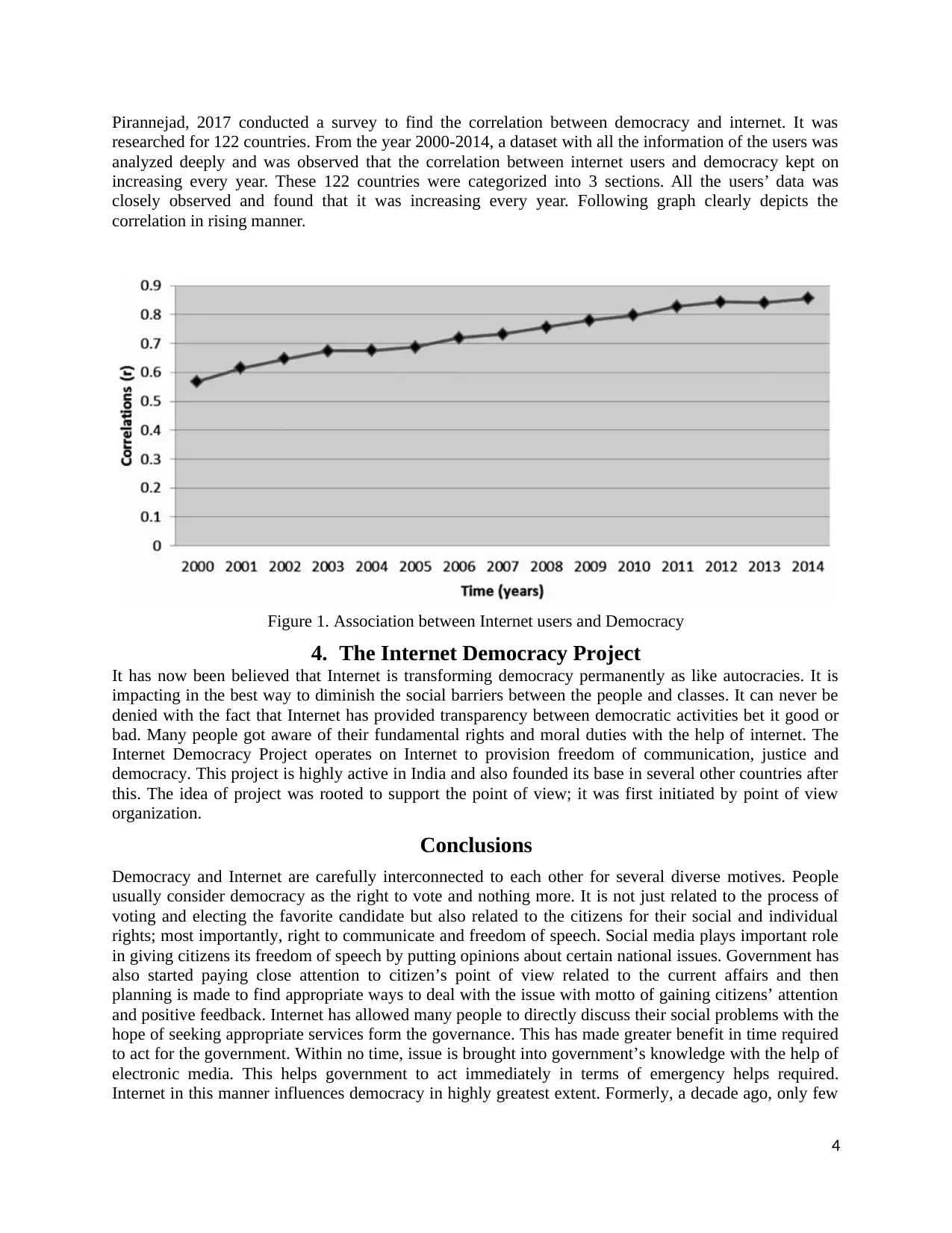
Pirannejad, 2017 conducted a survey to find the correlation between democracy and internet. It was
researched for 122 countries. From the year 2000-2014, a dataset with all the information of the users was
analyzed deeply and was observed that the correlation between internet users and democracy kept on
increasing every year. These 122 countries were categorized into 3 sections. All the users’ data was
closely observed and found that it was increasing every year. Following graph clearly depicts the
correlation in rising manner.
Figure 1. Association between Internet users and Democracy
4. The Internet Democracy Project
It has now been believed that Internet is transforming democracy permanently as like autocracies. It is
impacting in the best way to diminish the social barriers between the people and classes. It can never be
denied with the fact that Internet has provided transparency between democratic activities bet it good or
bad. Many people got aware of their fundamental rights and moral duties with the help of internet. The
Internet Democracy Project operates on Internet to provision freedom of communication, justice and
democracy. This project is highly active in India and also founded its base in several other countries after
this. The idea of project was rooted to support the point of view; it was first initiated by point of view
organization.
Conclusions
Democracy and Internet are carefully interconnected to each other for several diverse motives. People
usually consider democracy as the right to vote and nothing more. It is not just related to the process of
voting and electing the favorite candidate but also related to the citizens for their social and individual
rights; most importantly, right to communicate and freedom of speech. Social media plays important role
in giving citizens its freedom of speech by putting opinions about certain national issues. Government has
also started paying close attention to citizen’s point of view related to the current affairs and then
planning is made to find appropriate ways to deal with the issue with motto of gaining citizens’ attention
and positive feedback. Internet has allowed many people to directly discuss their social problems with the
hope of seeking appropriate services form the governance. This has made greater benefit in time required
to act for the government. Within no time, issue is brought into government’s knowledge with the help of
electronic media. This helps government to act immediately in terms of emergency helps required.
Internet in this manner influences democracy in highly greatest extent. Formerly, a decade ago, only few
4
researched for 122 countries. From the year 2000-2014, a dataset with all the information of the users was
analyzed deeply and was observed that the correlation between internet users and democracy kept on
increasing every year. These 122 countries were categorized into 3 sections. All the users’ data was
closely observed and found that it was increasing every year. Following graph clearly depicts the
correlation in rising manner.
Figure 1. Association between Internet users and Democracy
4. The Internet Democracy Project
It has now been believed that Internet is transforming democracy permanently as like autocracies. It is
impacting in the best way to diminish the social barriers between the people and classes. It can never be
denied with the fact that Internet has provided transparency between democratic activities bet it good or
bad. Many people got aware of their fundamental rights and moral duties with the help of internet. The
Internet Democracy Project operates on Internet to provision freedom of communication, justice and
democracy. This project is highly active in India and also founded its base in several other countries after
this. The idea of project was rooted to support the point of view; it was first initiated by point of view
organization.
Conclusions
Democracy and Internet are carefully interconnected to each other for several diverse motives. People
usually consider democracy as the right to vote and nothing more. It is not just related to the process of
voting and electing the favorite candidate but also related to the citizens for their social and individual
rights; most importantly, right to communicate and freedom of speech. Social media plays important role
in giving citizens its freedom of speech by putting opinions about certain national issues. Government has
also started paying close attention to citizen’s point of view related to the current affairs and then
planning is made to find appropriate ways to deal with the issue with motto of gaining citizens’ attention
and positive feedback. Internet has allowed many people to directly discuss their social problems with the
hope of seeking appropriate services form the governance. This has made greater benefit in time required
to act for the government. Within no time, issue is brought into government’s knowledge with the help of
electronic media. This helps government to act immediately in terms of emergency helps required.
Internet in this manner influences democracy in highly greatest extent. Formerly, a decade ago, only few
4
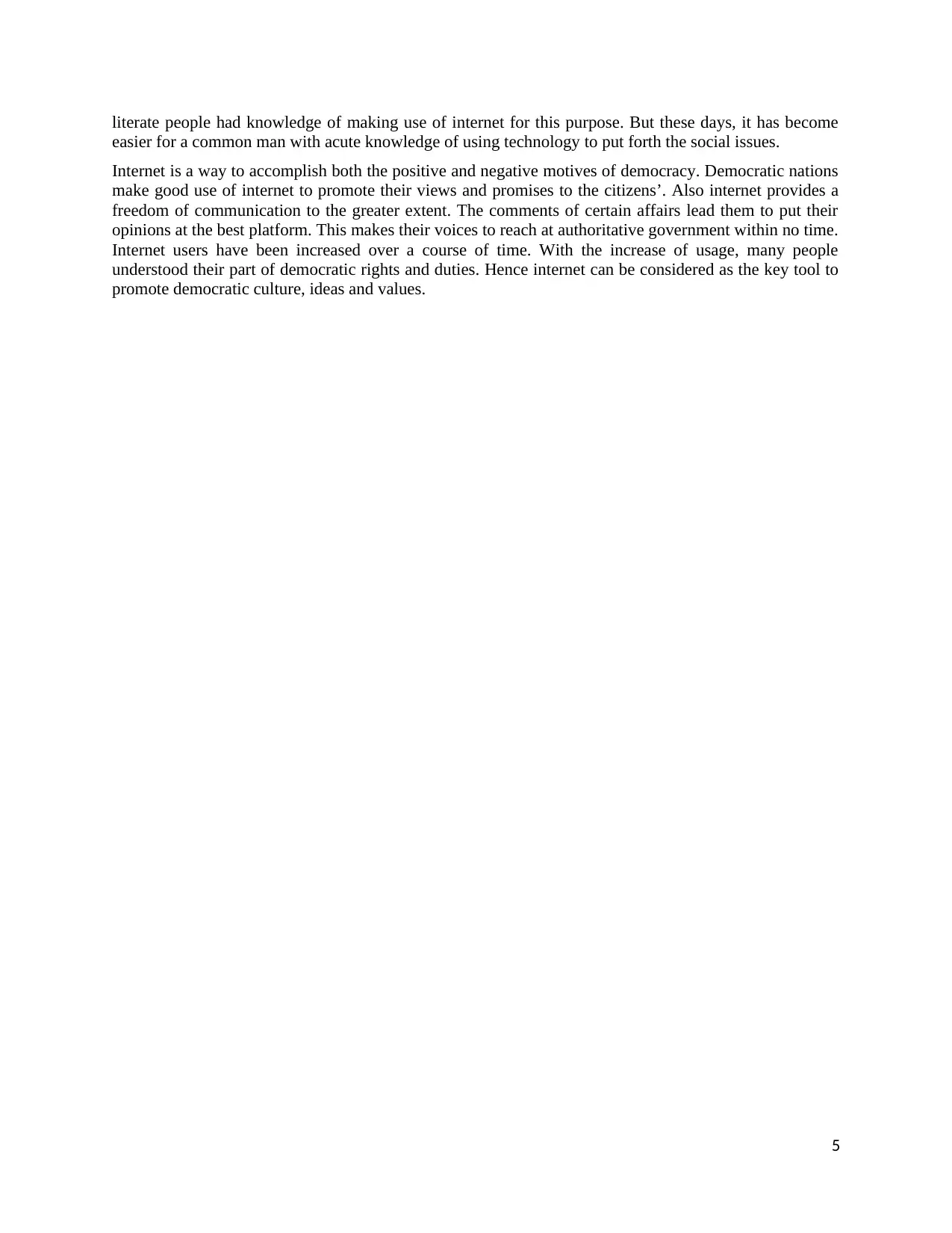
literate people had knowledge of making use of internet for this purpose. But these days, it has become
easier for a common man with acute knowledge of using technology to put forth the social issues.
Internet is a way to accomplish both the positive and negative motives of democracy. Democratic nations
make good use of internet to promote their views and promises to the citizens’. Also internet provides a
freedom of communication to the greater extent. The comments of certain affairs lead them to put their
opinions at the best platform. This makes their voices to reach at authoritative government within no time.
Internet users have been increased over a course of time. With the increase of usage, many people
understood their part of democratic rights and duties. Hence internet can be considered as the key tool to
promote democratic culture, ideas and values.
5
easier for a common man with acute knowledge of using technology to put forth the social issues.
Internet is a way to accomplish both the positive and negative motives of democracy. Democratic nations
make good use of internet to promote their views and promises to the citizens’. Also internet provides a
freedom of communication to the greater extent. The comments of certain affairs lead them to put their
opinions at the best platform. This makes their voices to reach at authoritative government within no time.
Internet users have been increased over a course of time. With the increase of usage, many people
understood their part of democratic rights and duties. Hence internet can be considered as the key tool to
promote democratic culture, ideas and values.
5
⊘ This is a preview!⊘
Do you want full access?
Subscribe today to unlock all pages.

Trusted by 1+ million students worldwide
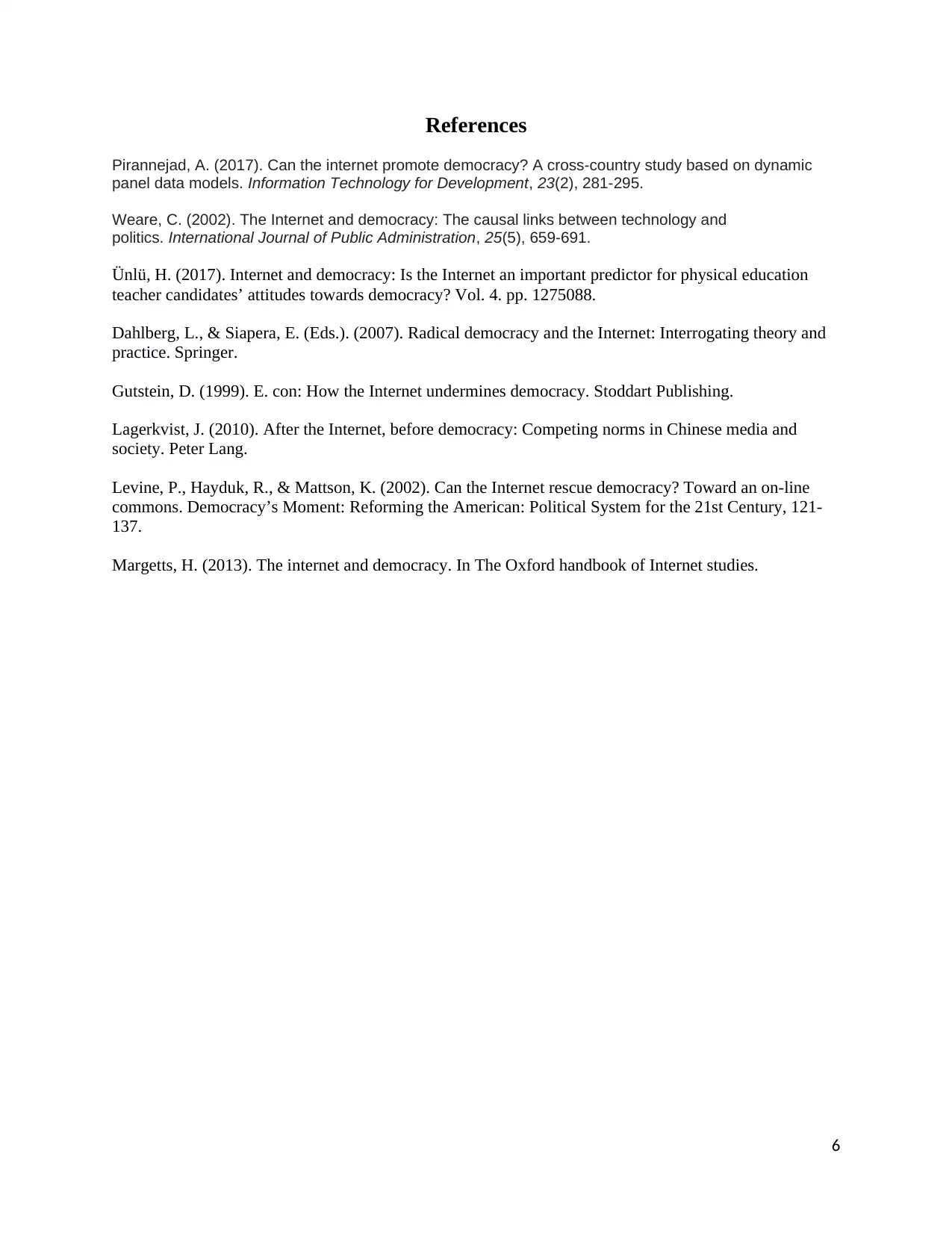
References
Pirannejad, A. (2017). Can the internet promote democracy? A cross-country study based on dynamic
panel data models. Information Technology for Development, 23(2), 281-295.
Weare, C. (2002). The Internet and democracy: The causal links between technology and
politics. International Journal of Public Administration, 25(5), 659-691.
Ünlü, H. (2017). Internet and democracy: Is the Internet an important predictor for physical education
teacher candidates’ attitudes towards democracy? Vol. 4. pp. 1275088.
Dahlberg, L., & Siapera, E. (Eds.). (2007). Radical democracy and the Internet: Interrogating theory and
practice. Springer.
Gutstein, D. (1999). E. con: How the Internet undermines democracy. Stoddart Publishing.
Lagerkvist, J. (2010). After the Internet, before democracy: Competing norms in Chinese media and
society. Peter Lang.
Levine, P., Hayduk, R., & Mattson, K. (2002). Can the Internet rescue democracy? Toward an on-line
commons. Democracy’s Moment: Reforming the American: Political System for the 21st Century, 121-
137.
Margetts, H. (2013). The internet and democracy. In The Oxford handbook of Internet studies.
6
Pirannejad, A. (2017). Can the internet promote democracy? A cross-country study based on dynamic
panel data models. Information Technology for Development, 23(2), 281-295.
Weare, C. (2002). The Internet and democracy: The causal links between technology and
politics. International Journal of Public Administration, 25(5), 659-691.
Ünlü, H. (2017). Internet and democracy: Is the Internet an important predictor for physical education
teacher candidates’ attitudes towards democracy? Vol. 4. pp. 1275088.
Dahlberg, L., & Siapera, E. (Eds.). (2007). Radical democracy and the Internet: Interrogating theory and
practice. Springer.
Gutstein, D. (1999). E. con: How the Internet undermines democracy. Stoddart Publishing.
Lagerkvist, J. (2010). After the Internet, before democracy: Competing norms in Chinese media and
society. Peter Lang.
Levine, P., Hayduk, R., & Mattson, K. (2002). Can the Internet rescue democracy? Toward an on-line
commons. Democracy’s Moment: Reforming the American: Political System for the 21st Century, 121-
137.
Margetts, H. (2013). The internet and democracy. In The Oxford handbook of Internet studies.
6
1 out of 7
Related Documents
Your All-in-One AI-Powered Toolkit for Academic Success.
+13062052269
info@desklib.com
Available 24*7 on WhatsApp / Email
![[object Object]](/_next/static/media/star-bottom.7253800d.svg)
Unlock your academic potential
Copyright © 2020–2026 A2Z Services. All Rights Reserved. Developed and managed by ZUCOL.





